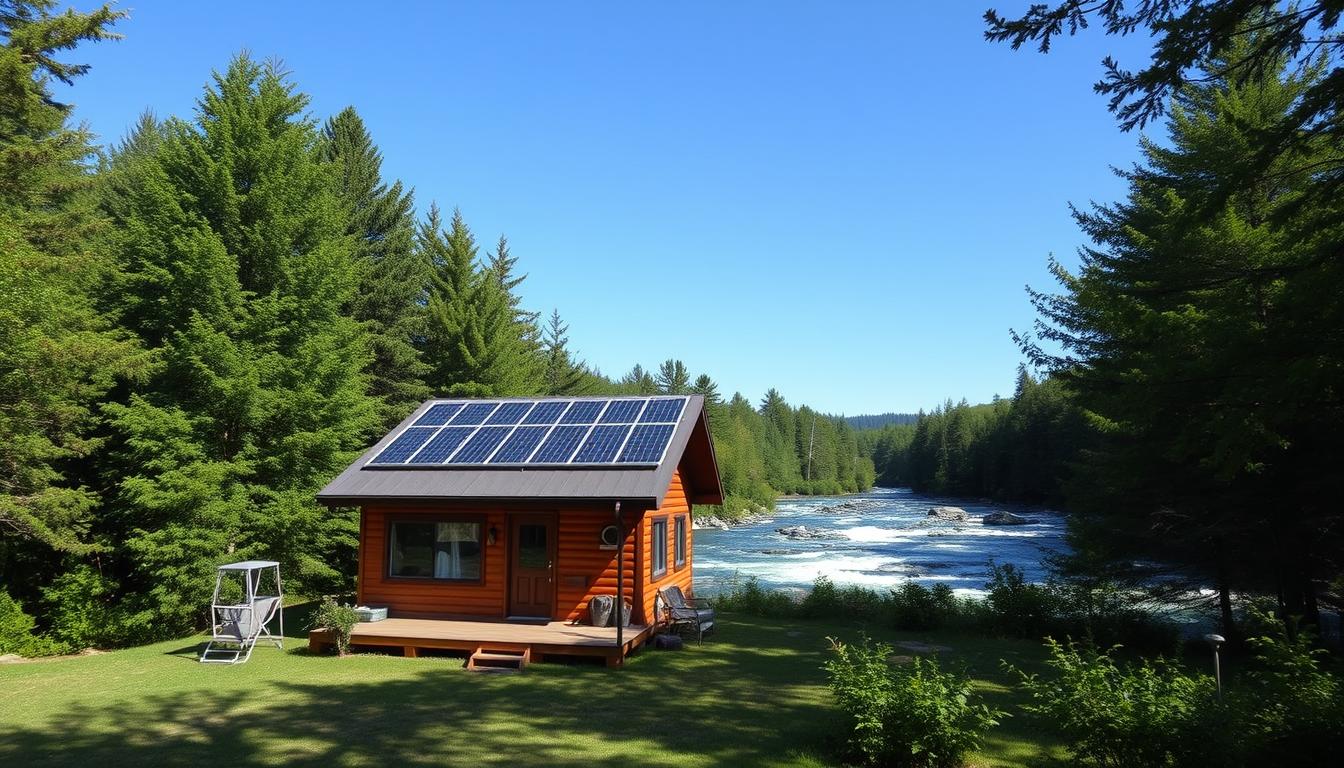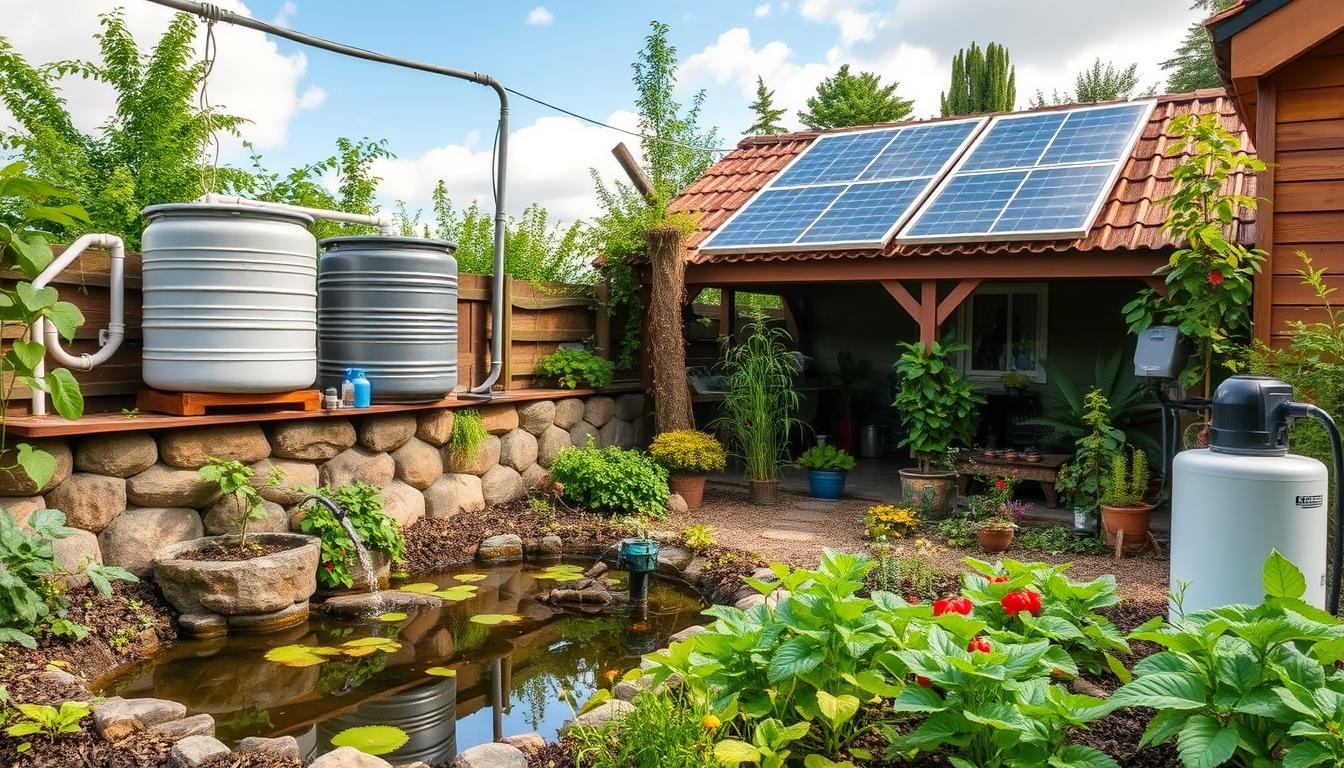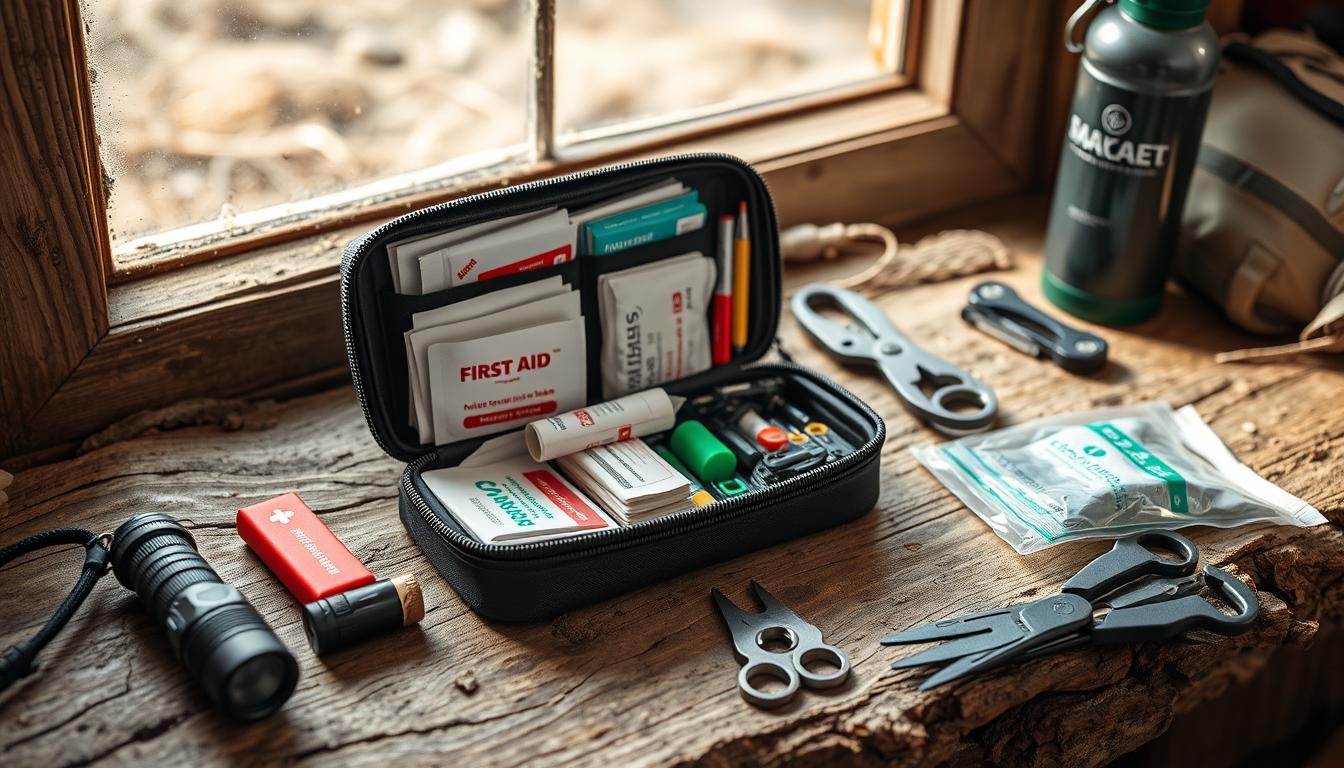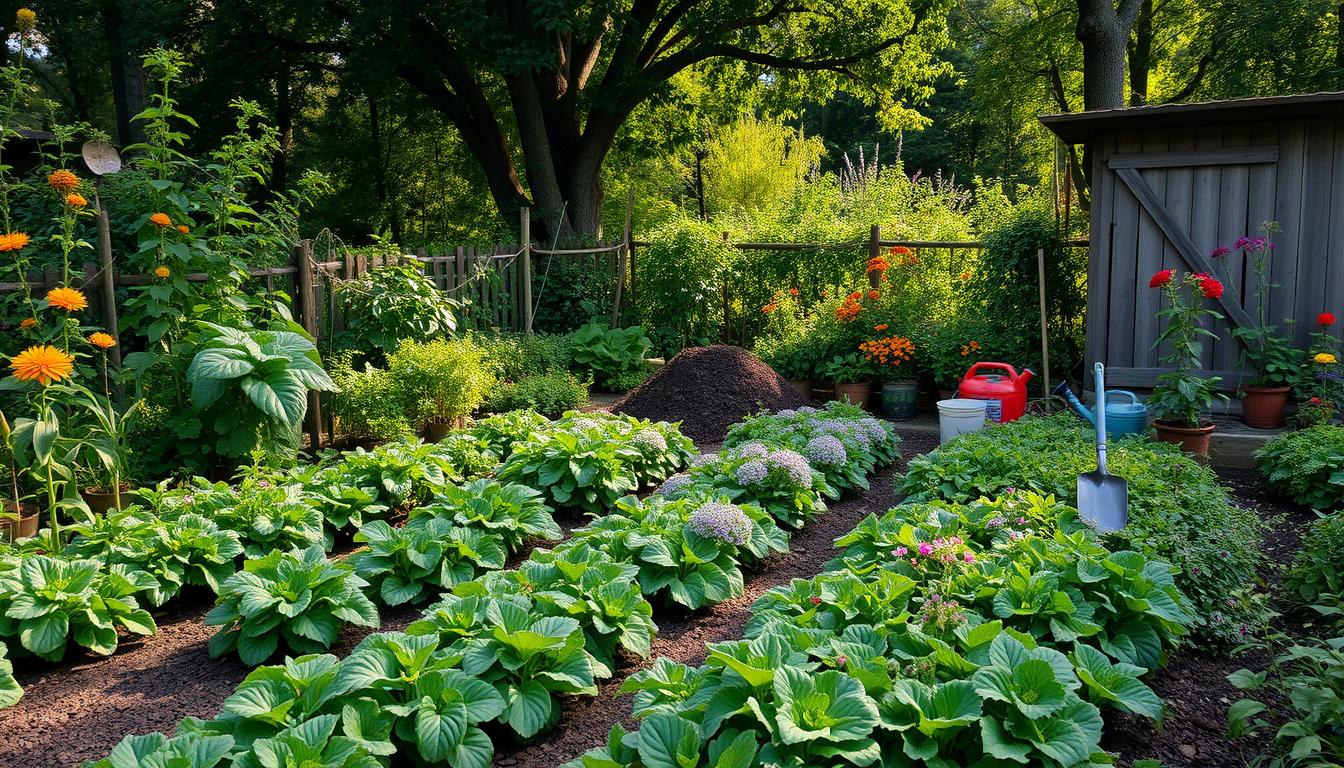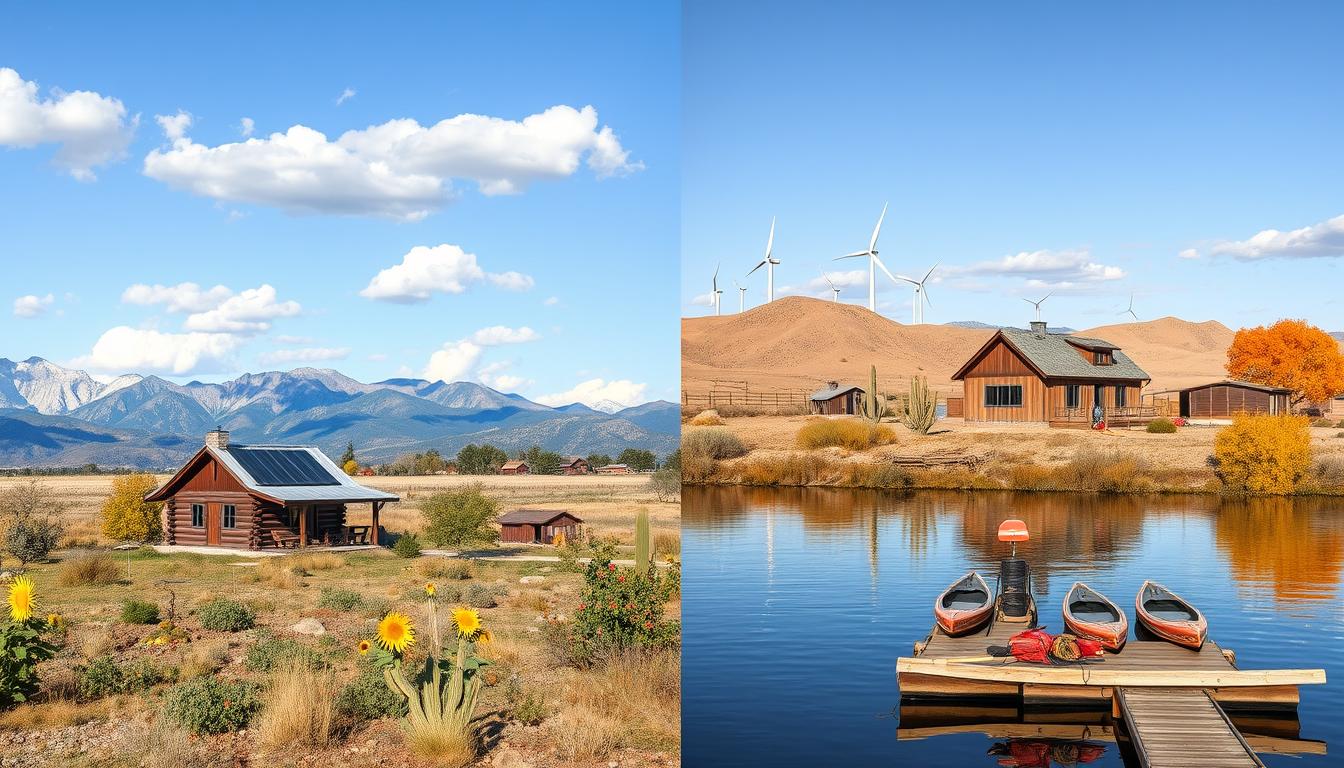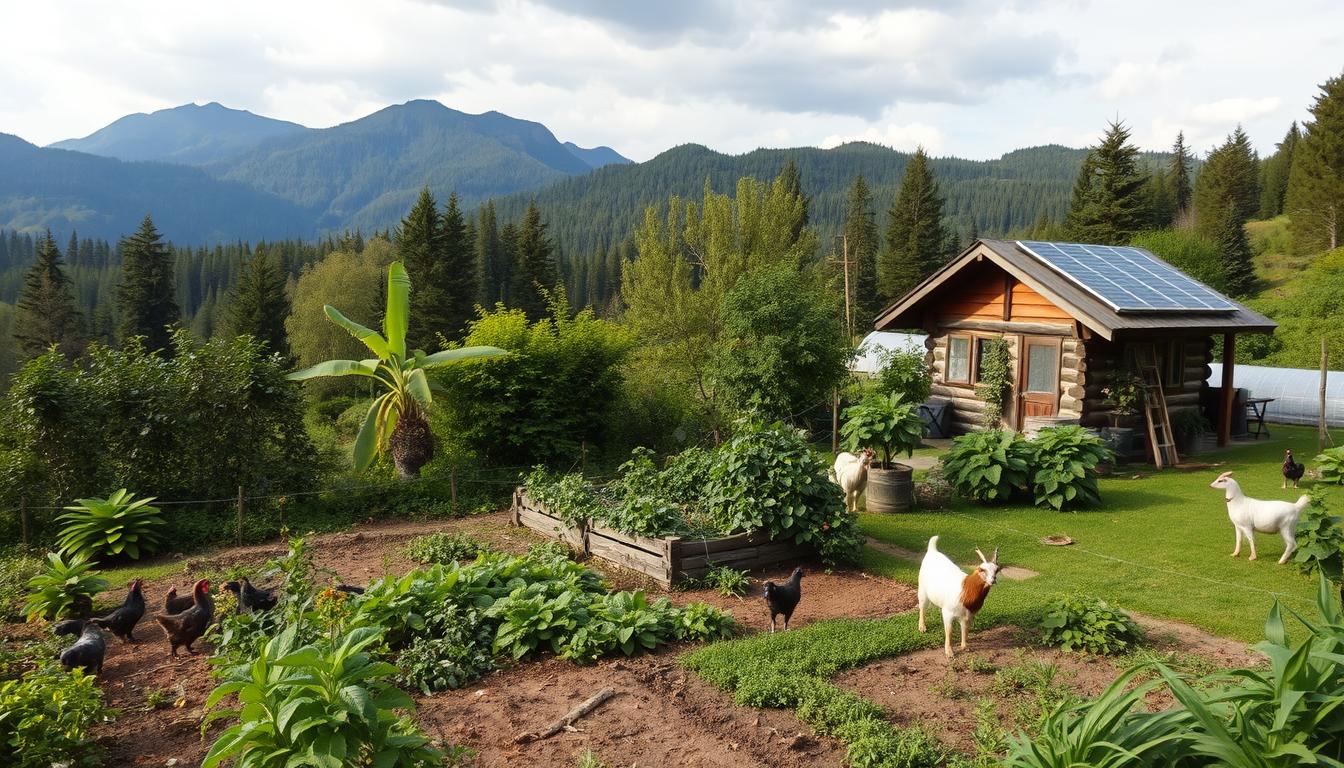In today’s fast-changing world, we all want sustainable, eco-friendly power. More people and communities aim for energy independence and want to lessen their carbon footprint. This article looks into off-grid power, showing the benefits, challenges, and how to make the switch.
Key Takeaways
- Discover the advantages of going off-grid, including increased energy independence and a reduced environmental impact.
- Explore a range of renewable energy technologies, including solar, wind, hydroelectric, and geothermal power.
- Learn how to calculate your energy needs and design an off-grid power system that meets your specific requirements.
- Understand the regulatory considerations and permitting process for off-grid living.
- Discover practical strategies for reducing energy consumption and maximizing the efficiency of your off-grid power system.
Introduction to Off-Grid Living
Today, more people want to live off the grid for energy independence and self-sufficiency. This way of living uses renewable energy to cut down on carbon emissions. It’s a step towards a greener lifestyle.
The Benefits of Going Off-Grid
Living off the grid means having more control over your energy use. You can use solar, wind, and hydroelectric power. This makes you less dependent on the power grid and lowers your bills. It’s good for the planet and helps you manage your energy better.
Challenges of Transitioning to Off-Grid Power
- Starting with renewable energy can be expensive upfront.
- It takes time to get used to using energy wisely.
- Dealing with permits and rules for off-grid systems can be hard.
Even with these challenges, the benefits of off-grid living are clear. You gain more independence and help the environment. It’s a choice for those wanting to move away from traditional power sources.
Solar Power: A Renewable Energy Solution
Solar power is becoming a key renewable energy choice. It helps meet the growing need for sustainable and independent power. Solar panel technology has improved a lot. Now, it’s a good option for powering homes or businesses away from the main grid.
Understanding Solar Panel Technology
Solar power uses photovoltaic systems to turn sunlight into electricity. These systems have solar panels made up of solar cells. These cells catch the sun’s energy. They change sunlight into direct current (DC) electricity, which can be changed to alternating current (AC) for use.
Solar panel technology has gotten better, offering many choices for off-grid use. You can pick from monocrystalline, polycrystalline, or thin-film panels. Each type has its own benefits and efficiency, fitting different energy needs and budgets.
Calculating Your Solar Power Needs
Switching to off-grid solar power means figuring out your energy use. Look at how much power you need every day. Think about your appliances, lights, and other electric devices. Knowing your energy use helps you pick the right size solar panel system.
Also, knowing your local weather and sunlight can help make your solar system work better. This ensures you get enough power all year.
“Solar power is not only a sustainable energy source, but it also empowers individuals to take control of their energy needs and become more self-reliant.”
Wind Power: Harnessing Nature’s Might
Wind power is becoming a key solution for those wanting to be energy independent. Wind turbines use the wind to make clean, sustainable electricity. This electricity can power homes and communities off the grid. It’s a great way to cut down on fossil fuel use and help the planet.
Figuring out if wind power is right for a location involves looking at several things. Wind resource assessment looks at wind speed, direction, and how often it blows. It also looks at the land and any things that might block the wind. This helps people pick the best spot and size for their off-grid wind turbines to make the most energy.
- Evaluate the wind speed and direction at the proposed site
- Consider the terrain and potential obstacles that may affect wind flow
- Determine the appropriate size and type of wind turbine for your energy needs
- Integrate the wind power system with other renewable energy sources for a comprehensive off-grid power solution
Using wind power lets homeowners use less grid power and be more independent. When combined with other renewable energy, it makes off-grid living reliable and green. This leads to a more eco-friendly and self-sufficient way of life.
“The wind is not only a source of energy, but also a source of freedom.”
Hydroelectric Power: Tapping into Water’s Potential
The world is looking for sustainable and renewable energy sources. Hydroelectric power is a key solution for off-grid power needs. It uses the natural flow of water to provide reliable and eco-friendly energy. This helps people cut down on traditional grid-based electricity.
Micro-Hydro Systems for Off-Grid Homes
Micro-hydro systems are a big deal in renewable energy. They’re perfect for off-grid homes and communities. These small units offer a clean, steady source of electricity that fits well with other power solutions.
These systems capture the energy from flowing or falling water. This energy turns a turbine, which makes electricity. You can put them in streams, rivers, or small waterfalls, making them great for many off-grid places.
Micro-hydro systems have lots of benefits. They give a steady power supply, often running 24/7 all year. They also have a small environmental impact, which is good for those wanting to protect nature.
“Hydroelectric power is a renewable, sustainable, and cost-effective energy source that can play a crucial role in powering off-grid communities and homes.”
Setting up a micro-hydro system needs careful thought. You must look at water resources, power needs, and infrastructure. Getting professional help for installation is key to make sure it works well and safely.
Hydroelectric power and micro-hydro systems are great for off-grid homes and communities. They use water’s energy to lessen the need for fossil fuels. This leads to a more sustainable future.
Geothermal Energy: Utilizing the Earth’s Heat
The world is looking for new, green energy sources. Geothermal energy is a top choice. It uses the Earth’s heat, which is always there. This makes it a steady and green way to power homes off the grid.
Ground-source heat pumps lead this change. They use the Earth’s steady temperature to heat and cool homes. This makes them a smart choice for saving energy and using renewable energy.
Ground-Source Heat Pumps
Ground-source heat pumps are great for heating and cooling off-grid places. They don’t use fossil fuels like old systems do. Instead, they use the Earth’s heat just under the surface.
These pumps have many benefits:
- They use less energy and cut down on bills
- They keep your home warm or cool, no matter the weather outside
- They’re good for the planet because they don’t burn fossil fuels
- They last a long time, often 20-25 years or more
Using the Earth’s heat, ground-source heat pumps are a smart choice. They make heating and cooling your off-grid place efficient and green. They’re key to using geothermal energy and saving on energy costs.
“Geothermal energy is a renewable, sustainable, and clean energy source that can provide reliable heating and cooling for off-grid homes and buildings.”
Biomass and Biofuel: Sustainable Power from Organic Matter
The world is turning to renewable energy sources, and biomass and biofuel are key players. They come from things like farm waste, wood chips, and even food scraps. By using the energy in these materials, we can make electricity, heat, and fuel for our needs.
Biomass energy makes heat or power by burning organic stuff. Biofuel is a liquid or gas made from these same materials. Both are green ways to make energy, cutting down on fossil fuels and helping our planet.
- Biomass energy comes from things like farm waste, forest leftovers, and special crops.
- Biofuels, like ethanol and biodiesel, come from crops or waste oil.
- These renewable energy sources can power off-grid homes and businesses.
Using biomass and biofuel is good for the planet and cuts down on harmful emissions. It’s part of living sustainably. As we find new ways to make biomass energy and biofuel, they’ll be key to our off-grid future.
“Biomass and biofuels represent a promising path towards a more sustainable energy future, one that is both eco-friendly and self-sufficient.” – Dr. Emily Greenfield, Renewable Energy Researcher
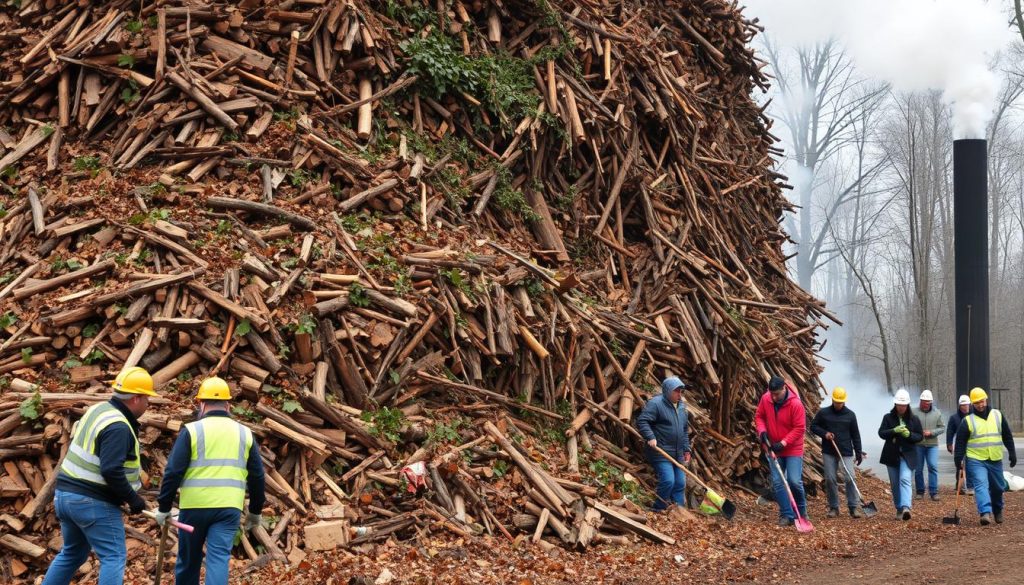
Alternative Energy Sources: A Comprehensive Approach
Living off-grid means using many alternative energy sources for energy independence. Mixing solar, wind, and hydroelectric power creates a strong and steady energy supply. This hybrid system is key to reliable energy.
Combining Multiple Power Sources
Using different energy sources has big advantages. Solar panels catch sunlight, wind turbines use wind, and micro-hydro systems use water flow. Together, these sources make a flexible and steady power plan.
Energy Storage Solutions
Storing energy is vital for off-grid power. Battery banks save extra power for when you need it most. New tech like pumped-storage hydroelectricity and thermal energy storage also help store and share power well.
“Combining multiple alternative energy sources and implementing advanced energy storage solutions is the key to achieving true energy independence in off-grid living.”
With a full plan for energy sources and storage, you can make a strong off-grid power system. This system meets your energy needs and helps the planet. It lets you be energy free and cut down on traditional electricity use.
Off-Grid Power Systems: Installation and Maintenance
Switching to an off-grid power system is a big step towards living sustainably. But, setting it up and keeping it running can feel overwhelming. Luckily, with some guidance, homeowners can do it well, either by hiring experts or going the DIY route.
Professional Assistance and DIY Options
Installing an off-grid power system gives homeowners a choice: hire a pro or do it themselves. Professional assistance brings expertise in designing the system, picking the right parts, and making sure it works well and safely. On the flip side, a DIY off-grid power project lets you customize it and be more hands-on. But, it takes more tech skills and time.
Choosing your path, keeping up with system maintenance is key for your off-grid power systems to last. This means cleaning solar panels, checking batteries, and fixing any problems that pop up.
“Proper installation and careful upkeep are vital for a successful off-grid power system. With the right steps, you can use renewable energy and live more independently.”
Whether you go for professional assistance or a DIY off-grid power plan, moving towards energy freedom is fulfilling and empowering. Think about your options and stick with regular maintenance to make sure your system works great for a long time.
Reducing Energy Consumption: Conservation Strategies
Living off-grid means saving energy is key. By using smart ways to save energy, you can cut down your power use. This makes your off-grid power system work better. You can use less energy by choosing efficient appliances and smart lighting.
Energy-Efficient Appliances and Lighting
Buying energy-efficient appliances is a great way to save energy in your off-grid home. Look for Energy Star-certified fridges, washing machines, and other items that use less power but work just as well. Also, switch to LED lighting because it uses 75% less energy and lasts a lot longer.
- Prioritize energy efficiency when picking new appliances and lights
- Choose Energy Star-certified products for the best energy savings
- Switch to LED lighting in your off-grid home
“Saving energy is not just about saving money. It’s also about protecting our planet and cutting down on carbon emissions. Every small step towards saving energy can make a big difference over time.”
By using these energy-saving tips, you can lower your energy needs and live more sustainably off-grid. Remember, energy conservation is key to off-grid living and sustainable living.
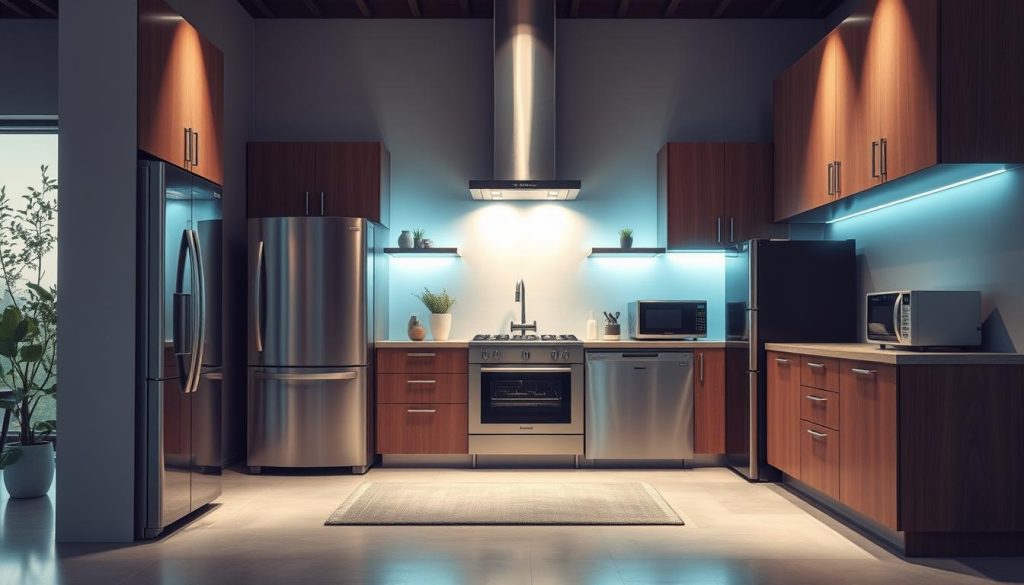
Regulatory Considerations and Permits
Going off-grid means dealing with many rules and permits. It’s key to know about local codes, zoning laws, and legal requirements before starting. Understanding off-grid regulations and off-grid permits is vital for your location and energy setup.
There are different rules and permits in various areas. You might need:
- Building permits for solar panels, wind turbines, or other energy systems
- Electrical permits to make sure your system is safe and meets standards
- Zoning laws that tell you where to put your energy sources and equipment
- Environmental permits if your system could affect nature
- Grid-interconnection requirements if you want to connect to the main power grid
If you ignore these legal requirements, you could face fines, delays, or losing your off-grid setup. It’s crucial to know the local codes and rules that apply to you. Make sure to get all needed permits before setting up your off-grid power.
“Navigating the regulatory landscape is crucial for a successful off-grid transition. Proactive planning and engagement with local authorities can help ensure a smooth and compliant process.”
By keeping up with the latest and working with local officials, you can make sure your off-grid setup follows all legal requirements and zoning laws. This makes for a smooth and green off-grid life.
Conclusion
Exploring alternative energy sources shows us the power of off-grid solutions. They lead us to energy independence and sustainable living. Solar, wind, hydroelectric, and geothermal energy are just a few options for eco-friendly power.
Using these renewable energy sources, people and communities can be more self-sufficient. They can also take better care of the environment. Off-grid power isn’t just about saving money. It also helps us connect with nature and conserve energy.
Starting your off-grid journey means taking a full approach. Mix different energy sources, make your energy use more efficient, and keep up with new rules. With careful planning and hard work, you can make the most of off-grid living. This helps create a sustainable and eco-friendly future.

